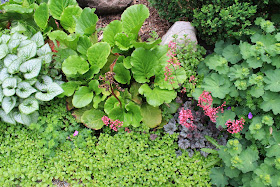The plants you see flowering on the shelves now, most likely will not be flowering two weeks from now. You are seeing plants at their flowering peak. For retail garden centers, timing is everything. The stores and nurseries work together to ensure stocked plants are in their seasonal prime. So, plants that flower in early spring, will be sold in late winter and early Spring, when they are showing off their colors to the best of their ability. Summer flowering plants are stocked in late Spring or early Summer. Fall flowering plants are displayed in late Summer or early Fall.
Stores are not attempting to rip you off. But don't be fooled by wishful thinking. These plants will not flower forever. Most plants bloom for three to six weeks. Then you are left with leaves and stems.
So, when purchasing your plants, consider the form, color and texture of a plant's foliage. Between periods of flowering, foliage holds a garden together. Consider using plants for the sake of their foliage and count the flowers as a bonus.
The challenge: planning your garden to ensure interest throughout the growing season. You can plant swaths of perennials, grasses and shrubs to create dramatic displays of your own. But keep in mind the limited flowering period of each plant. Plan for flowering lulls.
Ornamental Grass and Grass-like plants:
The variety of available grass and grass-like plants on the market today is astounding. There are ornamental grasses ranging in size from six inches to ten feet tall. Some clump, some spread, some weep, some stand upright. Grasses can be found in red, white, blue, silver, purple, black, variegated, striped, spotted and solid, broad of leaf or narrow. These plants flower in Spring, Summer, and Fall in plumes of red, pink, white, silver, brown, purple.... My point is this: grass offers a wide range of options that can bring interest in form, texture, and color.
Consider some of the ornamental grasses and grass-like plants below to bring beauty to your gardens.
Calamagrostis brachytricha - Korean Feather Reed Grass
Korean Feather Reed Grass matures at approximately 24" tall and 30" wide. This plant tends to be fairly loose in habit, especially when young. This grass does well in partial shade. I would use Korean Feather Reed Grass in the foreground of large flowering perennials such as Black-eyed Susan and Cone flower. The foliage color contrast with these particular perennials
Blue Spire Oat Grass
Festuca glauca'Elijah Blue' - Elijah Blue Fescue
This Fecue is a well controlled mounding/weeping grass that tends to be a deep steel blue and grows approximately 1' tall and 9" wide.
Stipa (Nasella) tenuissima - Ponytail Grass
Calamagrostis acutiflora 'Overdam' - Overdam Feather Reed Grass
Ornamental Grasses can be left standing through Fall and Winter to add form, texture and color to what could otherwise be a bleak or drab garden.
 |
| Astilbe |
 |
| Coral Bell |
For more tips and tricks to creating a lush and beautiful garden, continue reading my blog.
For help designing, installing or maintaining your landscape, feel free to give Brent Langley a call at (616) 328-3258. Thank you














No comments:
Post a Comment